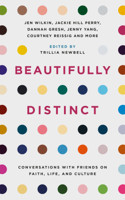
The visual arts give us a means of expressing our deepest feelings, fears, and joys, even if we don’t realize to whom we are expressing them.
When we seek to understand the messages in the movies we and our friends are watching, we are giving ourselves the tools to have a similar conversation—identifying the desires and longings of people’s hearts, and showing them how these are met in Christ.

Inspires women to engage with life and culture in a God-honoring way.
Learning to identify these feelings and longings has been a helpful tool to use with my children. Sometimes after watching something together, I will ask them what they thought certain characters were feeling at different points in the movie. A simple conversation like this conveys to them that the emotions they feel are normal and part of the way God designed them. It opens the door for us to identify ways in which characters expressed their emotions and whether those were healthy expressions or not.
Similarly, my husband, Erik, is great about asking our kids to identify symbolism and the messages of a movie, training them to view the story with their minds engaged. And it’s not just to our kids that he asks these questions. For several years he has hosted occasional “Manly Movie Nights,” which began with stereotypically masculine movies like Braveheart and Warrior and now include obscure Belgian films and dark Irish dramedies. At first when he began a conversation after the movie, it was awkwardly silent. Like strengthening an unused muscle, learning to look more deeply at movies takes time, and doing it collectively can feel strange. But Erik and his friends—both believers and nonbelievers—have learned so much from each other through this simple practice of asking questions about symbols, messages, themes, longing, and worldviews.
And it should come as no surprise that using stories can be an excellent entry point for gospel conversations, since this is just what Jesus did in his teaching ministry. How often did he illustrate truth with a story that his listeners could relate to? We may not be the ones telling the stories, but we can pray for discernment and wisdom to connect the stories we hear and see with the truth we know. This happens most often when we ask good questions like “Did you connect with any of the characters?” or “How did you feel while watching that?” or even something as simple as “What did you think about that movie?” Asking that question, and then listening intently to the response, can open our eyes to the views and ideals of the people around us.
None of this wisdom, insight and discernment are possible, however, unless we have in place a framework within which to view movies and TV. It is when we have tasted and seen the goodness of the Lord in the truth of his word that we are able to realize that other tastes and sights can never truly satisfy. Those who don’t know this are at the mercy of the messages they hear in the culture around them.
Engaging with movies means that we can understand a major way in which people in our culture express themselves and might reach out to God without even knowing it. We understand what they believe and what they are living for. We, who know the truth about what God is like and how to reach him, must make sure we are part of that conversation.
How should we listen to, and think in a gospel way about, the ordinary things we come across in modern life? Things we watch, read, eat, and do. There are so many voices saying so many different things that the temptations are to either disengage completely, or find ourselves being influenced more and more by the world.
In Beautifully Distinct, godly, clear-thinking women talk about a range of areas of life and culture. They help us to be thoughtful about films, books, and the media; set out biblical principles for approaching topics such as body image and racism; and encourage us to shape the world around us for Christ—becoming beautifully distinct.